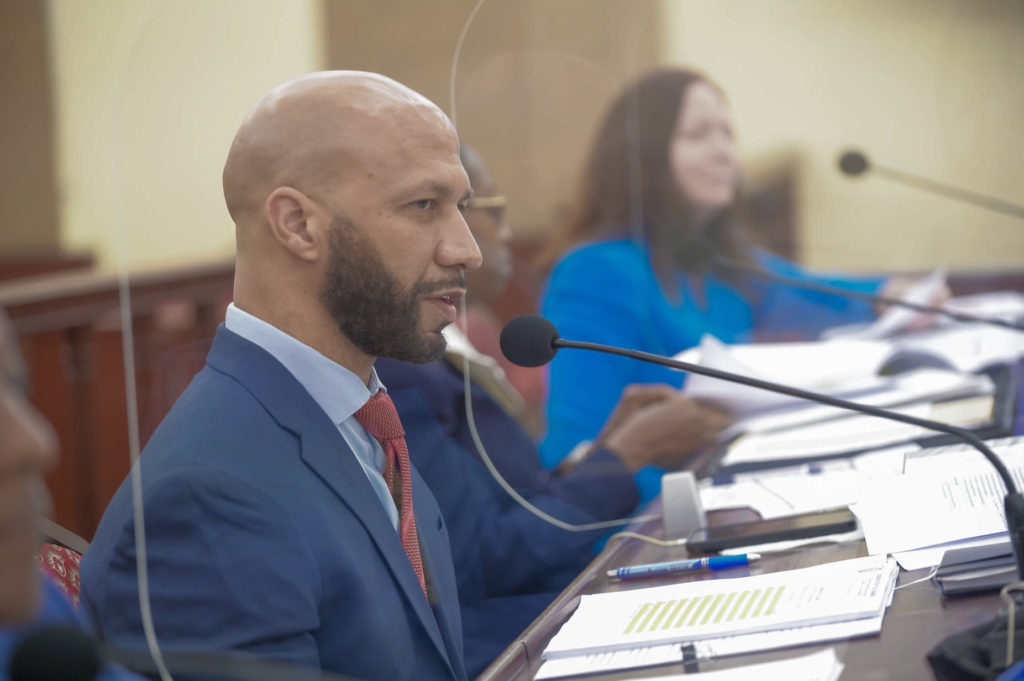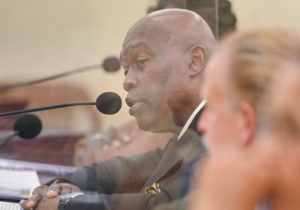
The high cost of pensions and other benefits at Schneider Regional Medical Center is making it difficult to attract the medical professionals the St. Thomas hospital needs, Schneider Regional CEO Dr. Luis Amaro said Friday while testifying before the Senate Committee on Finance.
The senators also heard from officials for the St. Thomas East End Medical Center and the Office of Collective Bargaining during Friday’s hearing.
Amaro said Schneider Regional’s operating budget is affected because the employer’s portion of a three percent contribution increase in FY 2020 from 20.5 percent to 23.5 percent remains unfunded.
The cost of benefits – $14 million – compared to the total wages of $42 million, means that Schneider Regional has a benefit expense rate of 34 percent. As a result, Amaro said attracting new employees and staff retention is harder because the high pension contributions reduce take-home pay.
When including employee paid time-off, the total benefit rate is 52 percent of an employee’s salary. But similar markets average about 30 percent, Amaro said.
“We have had many candidates decline offers due to the GERS deduction or resigned before becoming vested into the GERS system. Essentially, this mandate is creating a challenge for (the hospital) to acquire and retain the specialized talent we need to support our operations,” Amaro said.
In better news, the hospital’s turnover rate is down to 5 percent compared to 18 percent in recent years, he said, adding that the national average is 17 percent.
Sen. Kurt Vialet recommended that Schneider Regional develop a private retirement account to entice employees to work with Schneider. This would have the effect of reducing payments to the government pension system, speeding up its impending collapse and reducing the amount of money available to pay partial pension checks through current pension contributions.
Federal Medicare and Medicaid reimbursement rates fixed at 1982 levels also continue to strain the hospital’s finances, bringing in far less than the actual cost of providing services to those patients, Amaro said.
“Without being rebased to a more current year of expenses … (Schneider Regional) is challenged with attaining financial solvency as a small community-based hospital providing care 24 hours a day,” Amaro said. “In addition to that, the program does not have any cost carve-outs for high-cost items such as implants for joint replacements or for high-cost drugs such as chemotherapy. This leads to a perpetual under-reimbursement that the organization must ultimately absorb. We cannot overstate the dire need” to update the reimbursement structure, he said.
Sen. Carla Joseph asked if this disparity affected all states and territories. Amaro said it is a relic of federal law that impacts only certain insular territories, placing them at a disadvantage.
This out-of-date reimbursement schedule impacts every public medical facility in the USVI and has long been a bone of contention for the territory and a priority for at least the past two V.I. delegates to Congress and several governors.
Amaro said the total estimated uncompensated care, including the underfunding from Medicare and Medicaid Services, plus patients without any insurance coverage, is projected at $26.1 million for FY 2021, and $26.7 million for FY 2022.
“To this end, we would like to offer our sincere appreciation to this legislative body, in advance, for approving the board’s recommended budget appropriation of $26.75 million, which appropriately covers our projected uncompensated care costs for FY 2022,” Amaro said.
Schneider Regional currently has 559 full-time equivalent employees, meaning some of these may not be full-time, but the number of hours worked is equivalent to that number of full-time employees. Of those, 65 percent are clinical professionals, and 35 percent are non-clinical.
The hospital’s proposed V.I. government funding for fiscal year 2022 is $26.7 million. This is a 7 percent increase compared to the budget of FY 2021, according to Amaro. The FY 2022 budget breakdown of the total expenses of $86.9 million is as follows: $41.5 million for personnel services, $14 million for fringe benefits, $12.6 million for supplies, $4.1 million for utility services and $14.5 million for other services and charges.

St. Thomas East End Medical Center
The Finance Committee also heard from the St. Thomas East End Medical Center.
The governor’s recommended FY 2022 government funding totals $2.9 million for the St. Thomas East End Medical Center Corporation.
Medical Center Executive Director Moleto Smith Jr. told the committee the overall operating budget totals $11.7 million. The proposed General Fund appropriation represents 25 percent of the budget, while 64 percent, or $7.5 million, is for program income and 11 percent, or $1.3 million, is federal funds.
Smith said the center’s FY 2022 goals are to conclude construction drawings of the new facility, expand the behavioral health program, and provide training for workforce development.
The overall breakdown is as follows: $6.2 million for personnel salaries, $1.1 million for employee benefits, $2 million for contracts/consultants, $703,588 for supplies, $37,500 for travel, $25,000 for equipment, and $1.3 million for administrative and maintenance services.

Office of Collective Bargaining
Separately, the proposed budget for the Office of Collective Bargaining’s government funding and total budget comes to $1.2 million, Chief Labor Negotiator Joss Springette told the committee. The FY 2022 budget breakdown is $677,546 for wages and salaries, $316,934 for taxes and benefits, $31,000 for equipment and supplies, $164,000 for other services and $10,000 for utilities.
Defending the budget, Springette said the funds are needed to fill five vacancies. Currently, the Office of Collective Bargaining has 270 pending labor dispute cases. Although 52 cases were settled/resolved, Springette indicated that unions filed 95 new cases with OCB.
Present for Friday’s hearing were Sens. Joseph, Vialet, Janelle K. Sarauw, Franklin Johnson, Samuel Carrión, Dwayne DeGraff, Carla Joseph, Javan James, Milton Potter, and Marvin Blyden. Sen. Donna Frett-Gregory was absent.





